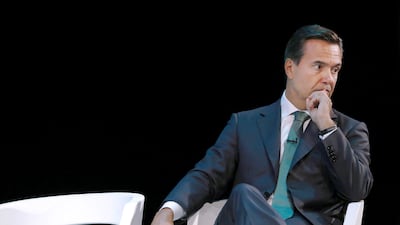On Thursday, Lloyds Banking Group will kick off the banking season with the announcement of its 2015 figures, which this year have an even more special interest. Lloyds, forced to accept an injection of £20 billion (Dh104.03bn) of government money in 2008 in return for a 43 per cent stake, is now healthy enough to consider paying out £2bn in dividends, including a special one-off payment of £500 million.
The big question the City is waiting to see the answer to is this: will the Bank of England, which has the ultimate say over it, agree that it has sufficient reserves to do so?
For seven years, Lloyds, which used to be one of the great income stocks so loved by small investors (it yielded up to 9 per cent in the early 2000s, twice that of the other banks), paid no dividend at all. It returned to the dividend list only last year with a token payout. This week, however, its chief executive, Antonio Horta-Osorio, wants to send the message that the bad days are behind it and that it is a fully functioning, well-capitalised and profitable bank with a bright future.
The government’s shareholding is now down to 9 per cent and it has so far sold its shares at a modest profit on its 73.6 pence price book value. However, in the great wipeout in the markets this year, which have taken a particularly heavy toll on bank shares, Lloyds dropped from 78p to 53p at one point before recovering to 61.8p now (Friday’s close).
A year ago they were touching 90p, and some of those shareholders who had stuck by the stock and followed their rights were in danger of getting their money back. The government was laughing all the way to the Bank (of England).
George Osborne, the British chancellor, was so chuffed by this that he even contemplated a Tell Sid-style (a classic, Thatcher-era advert to sell off British Gas shares) offer of his remaining shares to the general public. It would have made a nice little contribution – about £7bn – to his borrowing requirement. Now he has had to abandon, or at least postpone, the exercise.
Mr Horta-Osorio’s case is that the Black Horse bank is now, in the slightly exaggerated words of one newspaper over the weekend, “awash with cash”, and could hand back £20bn to shareholders over the next five years. When it ran into the post-Lehman crisis, Lloyds was the strongest of all the British domestic banks (which excludes HSBC and Standard Chartered), with a core, Tier 1 capital ratio of 6 per cent.
The acquisition of HBOS and £46bn of write-offs changed all that. But today, the figure is over 12 per cent and climbing, despite paying out about £14bn in compensation for mis-selling payment protection insurance, PPI.
Lloyds’ underlying profit, despite low interest rates and an unfriendly banking climate, has climbed back to £8bn a year and it is generating more cash than it needs. It doesn’t need or want more capital – so why not give some back to the long-suffering shareholders?
Lloyds’ predicament is what is called a “high-class problem”. Across Europe other banks are preparing for yet another financial crisis as collapsing oil and commodity prices, negative interest rates and miserable economic performances take their toll. At home, Standard Chartered is expected to announce a loss of about US$500m later this week after a massive restructuring charge. RBS, of which the government holds more than 80 per cent, will reveal its eighth annual loss in a row and the government has resigned itself to never seeing its money back. Barclays has all sorts of problems, including the Amanda Staveley fees saga, which I wrote about a few weeks ago (and which is becoming more fascinating by the day), and its figures ill reflect that.
Investors and pension funds reliant on dividends have also taken a savage beating elsewhere. One after the other, many of the old dependables, which never cut their dividends in their history, have either abandoned them altogether or reduced them sharply: Rio Tinto, Glencore and Anglo American, devastated by the commodity price collapse, have all delivered bad news on this front. The great oil companies BP and Shell are also struggling.
HSBC, however, to the market’s relief, yesterday announced it was retaining its “progressive” dividend policy with an increase from 50 cents to 51 cents, despite making a surprise $850m loss in the fourth quarter.
Lloyds alone is promising to relieve the gloom. It still has problems, with at least another £2bn of PPI payments to go, and potential competition issues because of its dominant market shares. It has so far laid off 45,000 staff since the 2008 merger with HBOS, with another 9,000 to go (giving it savings of £3bn a year).
As it goes more and more digital, it plans to close another 200 branches, and stands accused of charging its customers too much and treating its staff ruthlessly. Within a few years the headlines of profiteering at the expense of customers and staff, which used to plague the banks, will no doubt return. But for Mr Horta-Osorio, that’s another “high-class” problem.
The fact of the matter is that all of this was what the old Lloyds management set out to achieve when it bid for HBOS in 2008: market dominance, huge cost savings and No 1 position in British banking. They’re all there. Unfortunately it has come at a massive cost to shareholders: the number of shares in issue has gone from 5.5bn to 72bn.
Surely after all that suffering they deserve a little reward.
Ivan Fallon is a former business editor of The Sunday Times and the author of Black Horse Ride: The Inside Story of Lloyds and the Financial Crisis.
business@thenational.ae
Follow The National's Business section on Twitter

